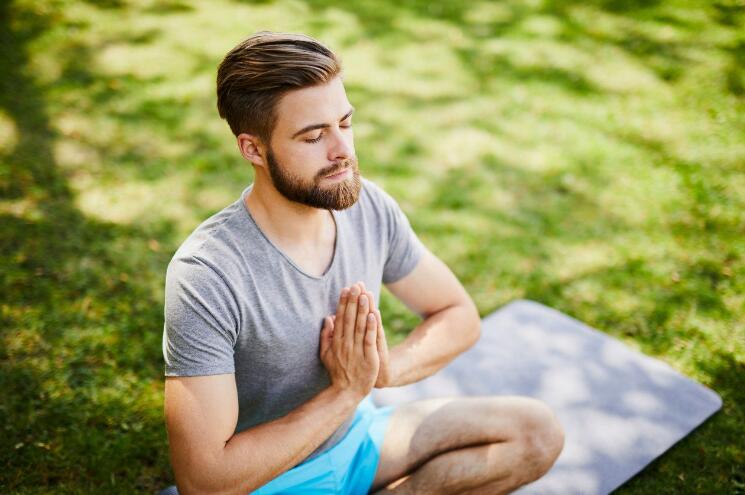Did you know that yoga can be used as an alternative to drug use? In fact, it is incredibly effective in helping people overcome addiction. How can yoga serve as an alternative to drug use?
Yoga helps to soothe the mind and body, and provides a sense of peace and well-being that is unmatched by any other form of exercise. If you are struggling with addiction, consider giving yoga a try! You may be surprised at how beneficial it can be.
How Does Yoga Help Drug Addiction?

Yoga is an effective method for treating drug addiction. Yoga can help to ease withdrawal symptoms, reduce stress and anxiety, and promote overall wellness.
Yoga is a mind-body practice that involves both physical and mental exercises. The physical component of yoga helps to strengthen and tone the body, while the mental component helps to focus the mind and promote relaxation.
Yoga is particularly helpful in treating addiction because it helps address the disease’s physical and mental aspects. Yoga can help ease withdrawal symptoms by helping the body detoxify and promote relaxation.
Yoga can also help reduce stress and anxiety by promoting positive thinking and helping the person develop a more positive outlook on life.
Overall, yoga is an effective treatment for drug addiction because it helps address the disease’s physical and mental causes.
The Science Behind The Yoga And Meditation Effect On The Drug Use

Yoga has long been touted as a holistic way to improve mental and physical health, but recent research is beginning to explore the science behind these claims.
The study found that yoga can help reduce cravings and withdrawal symptoms and improve mental and physical health. Yoga may also help to increase self-awareness and self-esteem, which can be vital for those in recovery.
Both yoga and meditation have been shown to be effective in reducing stress, improving sleep, and increasing self-awareness.
Yoga and meditation have also been shown to be effective in reducing the craving for drugs, alcohol, and cigarettes. In addition, yoga and meditation can help to improve the quality of life for those recovering from addiction.
Yoga and meditation can also help to increase the sense of self-worth and self-efficacy, which can be helpful in motivating individuals to stay away from drugs.
Author’s Note: This post is for informational purposes only and does not constitute medical advice. If you are struggling with addiction, please seek help from a medical professional.
If you or someone you know is struggling with addiction, there are many resources available to help. The National Institute on Drug Abuse (NIDA) offers a variety of resources, including information on treatment options and how to find help. You can also call the NIDA Helpline at 800-662-HELP (800-662-437).
What Are Some Positive Alternatives To Drug Use?

If you are struggling with addiction, there are many positive alternatives to drug use that can help you on your road to recovery.
Exercise, healthy eating, and therapy are all great options that can help you overcome addiction.
For example, people can go hiking, biking, swimming, or running instead of doing drugs.
These activities release endorphins, which have mood-boosting and pain-relieving effects. They also help to improve cardiovascular health, increase stamina, and promote weight loss.
In addition, they can help to reduce stress, anxiety, and depression. So, the next time you’re tempted to try drugs, consider doing something else. You might just find that you enjoy it more.
More Related Questions
1. Do I Need To Be Religious To Practice Yoga Or Meditation?
No, you do not need to be religious to practice yoga or meditation.
Yoga and meditation are secular practices that can be enjoyed by people of all religions and belief systems.
2. Is Yoga Or Meditation Better For Anxiety?
Both yoga and meditation can help reduce anxiety. However, it is important to find a practice that works for you.
If you are struggling with anxiety, consider trying both yoga and meditation. See which one you enjoy more and stick with it.
3. Can Meditation And Yoga Cure Anxiety?
Meditation and yoga cannot cure anxiety, but they can help to manage it.
If you are struggling with anxiety, consider trying both yoga and meditation. See which one works better for you and stick with it. Remember to be patient and give yourself time to learn the techniques. With practice, you will see a reduction in your anxiety.
Conclusion
Yoga and meditation can help to improve mental and physical health, reduce stress, and increase self-awareness. They can also be helpful in treating addiction by reducing cravings and withdrawal symptoms. If you are struggling with addiction, consider trying yoga or meditation as an alternative to drug use. With practice, you may find that you enjoy it more. Do you have any experience with yoga or meditation? Let us know in the comments below.
